Conference / Seminar / Webinar 08/09/2017
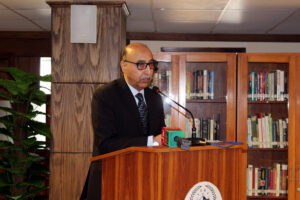
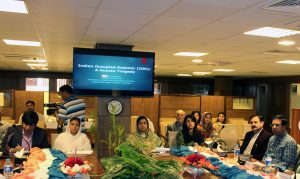
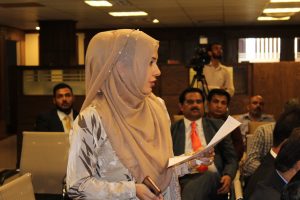
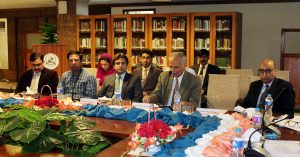
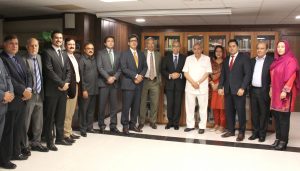
General:
A one-day workshop titled “Human Rights Violations in Indian Occupied Kashmir (IOK): Kashmiri Aspirations and Responsibility of International Community” was organized by the Islamabad Policy Research Institute (IPRI) on August 8, 2017 at IPRI conference hall, Islamabad. The workshop consisted of one working session, in addition to an inaugural session. The three sub-themes of the workshop, which came under discussion, were “Indian Occupied Kashmir (IOK): A Human Tragedy”, “Indian Occupied Kashmir (IOK): A Legal Anomaly,” and “Situation in IOK: Responsibility of International Community.”
Professor Dr. Pervaiz Iqbal Cheema, Dean, Faculty of Contemporary Studies (FCS), National Defence University (NDU), Islamabad chaired the workshop. The three eminent speakers included Professor Dr. Amna Mahmood, Chairperson, Department of Politics and International Relations, International Islamic University, Islamabad (IIUI), Mr. Ahmad Nazir Warraich, International Law Expert, and Major General (R) Hafiz Masroor Ahmed, Vice President, Centre for Global and Strategic Studies (CGSS), Islamabad. The viewpoints of the speakers were deliberated by the following discussants:
- Professor Dr. Syed Riffat Hussain, Head, Department of Government and Public Policy (GPP), School of Social Sciences and Humanities (S3H), National University of Science and Technology (NUST), Islamabad.
- Mujeeb Afzal, Assistant Professor, School of Politics and International Relations (SPIR), Quaid-i-Azam University (QAU), Islamabad.
- Ahmed Ijaz Malik, Assistant Professor, School of Politics and International Relations (SPIR), Quaid-i-Azam University (QAU), Islamabad.
- Jamal Aziz, Executive Director, Research Society of International Law (RSIL), Islamabad.
- Masood-ur-Rehman Khattak, Faculty Member, Department of International Relations (IR), International Islamic University, Islamabad (IIUI).
Concept Note:
It would be befitting to start any discussion on the Jammu and Kashmir dispute by reminding the world and India of the repeated pledges made at the highest level, which guaranteed the Kashmiri people of their future through a plebiscite. In particular, the then Prime Minister of India, Jawaharlal Nehru stated in October 1947 and 1951: “We [India] have declared that the fate of Kashmir is ultimately to be decided by the people. That pledge we have given… not only to the people of Kashmir but to the world. We will not and cannot back out of it. We are prepared…to have a referendum held under the auspices of the UN.” Yet, Jammu and Kashmir (J&K) has been simmering in decades of turmoil since 1947. Following the partition, based on declaration of the British government that princely states should either join India or Pakistan following the principle of geographical contiguity and will of the people, the status of the formerly independent princely state of Jammu and Kashmir was contested by both, India and Pakistan, which led to the first Kashmir war of 1947-48 and subsequent ceasefire with the establishment of the Line of Control (LoC), dividing Jammu and Kashmir between both the countries backed by a United Nations (UN) resolution. To get their “right to self-determination” to free themselves from Indian occupation, the Kashmiris continued with their freedom struggle, which was intensified in 1985. India responded by the adoption of brutal means of force to suppress the Kashmiri civilians and deployed over half a million soldiers in the valley. The intensity of freedom struggle in IOK varied from low to high and in 2010 and India again resorted to brutal methods of suppression of the Kashmiri demand of their “right to self-determination.”
In the recent time, there has been a surge in Kashmiri youth standing up against the atrocities of the Indian establishment. The face of this new uprising was Burhan Muzaffar Wani, a young social media savvy Kashmiri, who was killed by the Indian military forces. Wani’s killing led to widespread protests. Since then, according to the statistics provided by the J&K Directorate of Health Services Kashmir (DHSK), 15000 Kashmiris have been injured with 850 suffering from pellet injuries in the eyes. According to Amnesty International (AI), usage of pellet-firing shotguns is inherently “inaccurate and indiscriminate.” The report further states that the Indian security forces used arbitrary and excessive force against Kashmiri demonstrators on many occasions. The J&K government also imposed a curfew, which lasted over two months. As a result, private landlines, internet, and mobile service providers suspended their services after orders from the state authorities.
The human rights abuses in the Indian Occupied Kashmir (IOK) reached a new low when earlier this year, a 24-year old Farooq Ahmad Dar was tied to the front of a military jeep and was used as a human shield against the protestors. Major Leetul Nitin Gogoi of the Indian Army and the man behind the inhumane crime was shamelessly applauded by the Indian Army Chief, General Bipin Rawat, and was honoured for his “distinguished service.” Adding insult to injury, the Indian Army Chief defended the use of Kashmiris as human shields, describing it as an “innovative way” to respond to protests. Indian Army’s blatant disregard for human rights has been condemned by Human Rights Watch (HRW), whose Executive Director Kenneth Roth has termed General Rawat’s leadership as “criminal.” Furthermore, the Indian government has also created a deliberate shortage of food, medicines, and other basic amenities. Many analysts argue that such cruel practices could be constituted as crimes against humanity.
The Kashmiri struggle for “self-determination” had been sanctified by the UN in 1948. According to the Security Council’s resolutions of 1948 and 1949, “the question of accession of the state of Jammu and Kashmir to India or Pakistan will be decided through the democratic method of a free and impartial plebiscite.” But 70 years down the road, the Jammu and Kashmir dispute continues to set the region on a constant low boil. The international community, in particular, the UN and the West appear to have turned a blind eye to the sufferings of the Kashmiri people at the hands of the Indian government and its Army. Geo-political and geo-economic aspirations of regional and global players seem to have taken precedence over gross human rights violations taking place in Jammu and Kashmir.
Workshop Proceedings:
Ambassador (R) Abdul Basit, President IPRI, welcomed the distinguished speakers and discussants in the workshop. While dwelling on the theme of the workshop, he said that the deliberations in the conference should not just enhance our understanding of the issue, but also enable us to formulate recommendations that could be used in the policy making process. He said that Pakistan had been less successful in drawing the attention of the world community to the Jammu and Kashmir dispute as India continued to suppress the people of IOK with impunity, while international community remained oblivious to the human rights violations. He said the mainland India mostly remained unaware about developments in IOK and believed in the national narrative, which had been promoted by the establishment in New Delhi. He highlighted that in the post-9/11 period, a narrative had been developed by India, according to which legitimate struggle of Kashmiris for their right to self-determination had been associated with terrorism.
He suggested that Pakistan had to come up with a counter narrative to put pressure on India to revisit its Kashmir policy not only in the context of the human rights situation but also in finding a just and fair solution of the dispute. For this to happen, he gave two aspects on which Pakistan’s policy should be revolving, i.e. (i) at international level Pakistan had to come up with effective diplomacy in order to convince the international community to focus more on human rights violations and (ii) to build internal pressure on India by reaching out to ordinary Indians. He argued that Pakistan needed to part ways with old approaches and should adopt innovative approaches to resolve the dispute.
Professor Dr. Amna Mahmood, Chairperson, Department of Politics and International Relations, International Islamic University, Islamabad, while speaking on the topic, i.e. “Indian Occupied Kashmir (IOK): A Human Tragedy” said that Jammu and Kashmir was facing an unprecedented suppression by the Indian government. It is a human tragedy in the modern times, which needs to be addressed on an urgent basis. She said that the Indian government has been propagating to the Western states that the Jammu and Kashmir dispute is not about the right to self-determination but it is an issue of terrorism, sponsored by Pakistan. She opined that since the people from the West were not concerned about political or strategic basis of the issue and religious affiliations, so highlighting the situation in Jammu and Kashmir as a human tragedy was the only way that could alarm the public opinion and create awareness in the Western societies.
Giving the historical background of the Jammu and Kashmir dispute, Dr. Amna said that the Indian occupation of princely states of Gurdaspur, Ferozpur, and Zira were extremely important for India because these states provided road links to Kashmir. She aptly highlighted various forms of human rights violations in IOK that included massacres, fake encounters, mass graves, extra judicial killing by judicial personnel, disappearances, torture, and sexual assault. She explained in detail the inhuman and illegal use of Armed Forces Special Powers Act (AFSPA) by the Indian security forces deployed in IOK and said that the security forces were authorized to open fire, arrest without warrant, stop and search places and vehicles without permission, and to torture or use other kinds of force even if it caused death. She further elaborated that the army officers had legal immunity for their actions and there could be no prosecution, suit, or any other legal proceeding against anyone acting under that law.
Pointing towards the mass human graves in IOK, Dr. Amna said that mass graves had been identified in many parts by human rights activists. Finally, after a huge pressure, a State Human Rights Commission inquiry was launched in 2011, which had confirmed thousands of bullet-ridden bodies buried in hundreds of unmarked graves in IOK. Of the 2730 bodies uncovered in four of the 14 districts, 574 bodies were identified as missing locals. According to some estimates, the total number of unmarked graves was more than 6,700. “The Association of Parents of Disappeared Persons” has estimated that around 10,000 people have gone missing in the past 20 years. She told that according to the leaked diplomatic cables, the US officials, briefed by Red Cross staff, had evidence of widespread torture by Indian police and security forces about the systematic abuse of detainees in Jammu and Kashmir. Other cables showed that in 2007 American diplomats were concerned about the widespread human rights abuses by Indian security forces, who they said relied on torture for confessions. Dr. Amna Mahmood opined that the revelations have been embarrassing for New Delhi, which took pride in its status as the world’s so called biggest democracy.
Dr. Amna then pointed towards the “Country Report on Human Rights Practices 2016” by the US State Department, which had identified “instances of police and security force abuses, including extrajudicial killings, torture, and rape” by the security forces. The report has also mentioned the human rights violations in IOK as the most significant human rights problems in India. In the end, she described the post-Burhan Wani security situation in IOK and was of the view that there was an increase in the current wave of violence with Wani’s death since 2016.
Mr. Ahmad Nazir Warraich, International Law Expert, spoke on “Indian Occupied Kashmir: India’s Legal Obligations” and was of the opinion that Pakistan had a principled stance on the Jammu and Kashmir dispute as there was not only a political or legal connection but also an emotional linkage between Kashmiris and Pakistanis. He identified that India violated various international obligations that it itself had undertaken. For instance, the Universal Declaration of Human Rights (UDHR), despite being its non-binding character, has a special status and is considered part of the customary international law, which is binding on India too. He informed that there had been constant debate on whether international law was relevant in today’s world, which in fact was an outcome of weak understanding of how international law worked. When talking about international law, it is often referred to from the perspective of municipal law. This is a flawed way of looking at it, because, we do not live in a one state world. Actually, the international law defines different ways through which states could interact with each other and provides some reciprocity and certainty to state relations. This state interaction is governed by different customary laws and treaties. He said that right to self-determination was a peremptory norm in international law, which was considered so important that all states were expected to follow them. This concept of peremptory norm is applicable to the issue of IOK. He identified that special powers accorded to the Indian security forces violated the most of the basic freedoms of Kashmiris in IOK, which were part of the UN Human Rights Charter.
Major General (R) Hafiz Masroor Ahmed, Vice President, Centre for Global and Strategic Studies, Islamabad, spoke on “Situation in IOK: Responsibility of International Community.” He said that every human being had a social and moral responsibility towards other human beings, therefore; the international community had collective responsibility to end human rights violations in Jammu and Kashmir. He said that the UN was established in 1945 with one objective, i.e. to maintain peace and security in the world and in this regard, the Security Council and General Assembly had passed many resolutions. Therefore, the UN has a responsibility to work with states to end war crimes, genocide, and ethnic cleansing. He believed that the world community was aware of the magnitude of atrocities committed by the Indian security forces in Jammu and Kashmir.
He stated that it was ironical that given the grave human rights violations in IOK, the international community was silent. He suggested that since Pakistan could not extend military or economic support to the people of Jammu and Kashmir, it should continue to provide diplomatic, moral, and political support. He highlighted that traditional media along with social media could play an important role in creating awareness about human rights violations in Jammu and Kashmir.
Professor Dr. Pervaiz Iqbal Cheema, Dean, Faculty of Contemporary Studies, National Defense University, Islamabad, while chairing the working session, remarked that Pakistan needed to mobilize its internal strength for effectively mobilizing the international community for resolution of the Jammu and Kashmir dispute. He said that the government should appoint suitable persons, i.e. those who had a fair knowledge of Jammu and Kashmir affairs as the members of Kashmir committee. He believed that multilateralism was imperative for resolving India-Pakistan conflicts as Simla Accord, which proposed bilateralism, could not achieve its objectives for which it was concluded.
Input by Discussants:
Dr. Syed Riffat Hussain
- There is a resurgence of interest in issues of justice in the history of International Relations (IR) in the past 20-25 years. The seminal work on the theory of justice was done by John Rawls, who argued that if one wanted to change the situation, one had to think of better alternatives and this should be applied in case of Jammu and Kashmir.
- Roy Preiswerk in his famous write up titled “Could we study IR as the people matter?” raises the two interlinked issues, i.e. human beings and rights, which could be used in an argument that why Kashmiris’ fundamental human rights and their brutal suppression by the Indian security forces are of prime concern for the world community.
- The reason behind the so-called Indian success in the suppression of human rights in IOK are; India is one of the largest political economies of the world. Hence, the corporate world of the US and the EU do not want to make India unhappy. India under Modi is struggling to discredit the Kashmiri struggle by linking it with terrorism. There is a geo-political shift in the US where India has been considered as the net provider of security in the Indo-Pacific region.
- Pakistan has to be consistent in its support for Kashmiris and there is a need for a collective moral consciousness, which needs to be pricked and mobilized in the support of Kashmiris.
Dr. Mujeeb Afzal
- The Jammu and Kashmir dispute is seen as the combination of culture and power in the international community and throughout 50 years, it has only been seen as an issue of third world and Muslims. The international community has never seen any incentive in resolving the Jammu and Kashmir dispute. Virtually, it has remained irrelevant to the international community and it became relevant to the West only in the 1950’s when it needed Pakistan in its initial phase of constructing alliance with the Muslim states.
- The Jammu and Kashmir dispute is linked to Pakistan and Pakistan should become strong enough to raise the cost of occupation of India at the international level if India does not hold a result orient dialogue with Pakistan to resolve the dispute.
Mr. Jamal Aziz
- If one studies the history of the Jammu and Kashmir dispute, India has always shifted its legal position according to its own interests at that particular time. It was India that approached the UN Security Council for the resolution of the dispute in 1947 and when the resolutions went against India, it decided to add the instrument of accession through the Constituent Assembly, it changed its direction in the 1950s and then it changed its Constitution. It introduced Article 370 and Article 35 (A). At that point, Pakistan was vehemently against these inclusions. Today India propagates that these articles have become redundant.
- Pakistan should examine India’s obligations in the fourth Geneva Convention. Pakistan also needs to study whether the Security Council resolutions fall under the Article 6 or Article 7 of the IHL. For this, there are many International Court of Justice (ICJ) judgements, which could make a strong case for Pakistan.
Mr. Masood-ur-Rehman Khattak
- There has been a great transformation in Indian strategic thinking since 2001, especially after the Indian Parliament attack in 2002. In 2003, India revised its doctrine and came up with “Cold Start.” The purpose was to punish Pakistan in case of any terrorist attack that took place inside India. The weakness of this doctrine was exposed in 2008 after the Mumbai Attacks as they were not able to operationalize the so called doctrine.
- After the appointment of Ajit Doval as India’s National Security Advisor, Indian plan was to exploit Pakistan’s vulnerabilities, i.e. challenge Pakistan’s Afghan policy, pursue offensive diplomacy, and fund militants. Confessions of RAW agent Kulbhushan Jadhav confirmed India’s covert terrorist activities in Pakistan.
- India’s policy on Jammu and Kashmir is to brutally suppress the current uprising, to pressurize Pakistan through offensive diplomacy, and to label the Kashmiri struggle with militancy.
Recommendations:
- Pakistan should come up with a strong counter-narrative that the moral conscience of the international community could be brought to life as in actuality, there would be no durable peace in the subcontinent, unless the Kashmiris’ right to basic human rights are sanctified and protected.
- The Jammu and Kashmir dispute has two dimensions. Firstly, it is emotionally attached to the Pakistani nation. Secondly, it has a legal dimension. Pakistan also needs to highlight the legal dimension of the dispute at the international arena.
- India is signatory to the International Bill of Human Rights, which consists of three declarations such as the Universal Declaration of Human Rights (UDHR) 1948, International Covenant on Civil and Political Rights (ICCPR) 1966, and the International Covenant on Economic, Social, and Cultural Rights (ICESR) 1966. Pakistan should not only continue its efforts in demanding from India the fulfillment of its legal obligations to the human rights of the people of the Jammu and Kashmir state, but also press the UN Security Council (UNSC) to fulfill its legal obligations towards the innocent Kashmiris.
- Right to self-determination is a core principle of international law, arising from customary international law, and is also recognised as a general principle of law enshrined in a number of international treaties. For instance, right to self-determination is protected in the UN Charter and the ICCPR as a right to “all peoples” to which India is a signatory. In fact, international law offers Pakistan an opportunity to project the Jammu and Kashmir dispute in view of the globally-recognized “right to self-determination,” which could persuade the international community to build pressure on India to meet its legal obligation.
- Equally, there is a dire need for public diplomacy, thereby paving way for Pakistan to conduct an effective ‘”Legal Diplomacy” with India on the Jammu and Kashmir dispute.
- Pakistan has to be consistent in its support to fundamental rights of the Kashmiris and their struggle. For this purpose, synergies need to be created between public policy officials and academia to bring-forth this issue collectively through a well-organized institutional approach. In this context, seminars, workshops, rallies, series of exhibitions, and other gatherings should be organized in various cities of Pakistan and the world.
- Media and civil society can play a vital role in highlighting the blatant human rights violations being committed in IOK by Indian security forces. It is essential that Pakistani media houses should allocate their resources for adequate coverage of the Indian reign of terror unleashed in Jammu and Kashmir.
- For an effective policy and better understanding of the Jammu and Kashmir dispute, Pakistan should undertake intellectual investment on Kashmiri youth by offering more scholarships and hosting greater number of students from the state at local schools and universities. Ultimately, it will help Pakistan in developing a common narrative on the Jammu and Kashmir dispute.
- To make the committee more vibrant and effective, instead of being headed by a religious leader, it should be headed by a former diplomat or political leadership, having versatile experience in dealing with the UN or other international bodies.
The Jammu and Kashmir dispute is an unsolved question of 3rd June partition plan of 1947 and a legacy of the British Raj, which enhances the responsibility of the British government for facilitating the resolution of the dispute. As the Pakistani and Kashmiri diaspora is more vibrant in the UK, Pakistan should pay more attention in mobilizing that diaspora to persuade the British government for constraining India from committing human rights violations in IOK and facilitating the resolution of the Jammu and Kashmir dispute by garnering support of the international community.
Disclaimer: Views expressed are of the speakers and are not necessarily reflective of IPRI policy.

